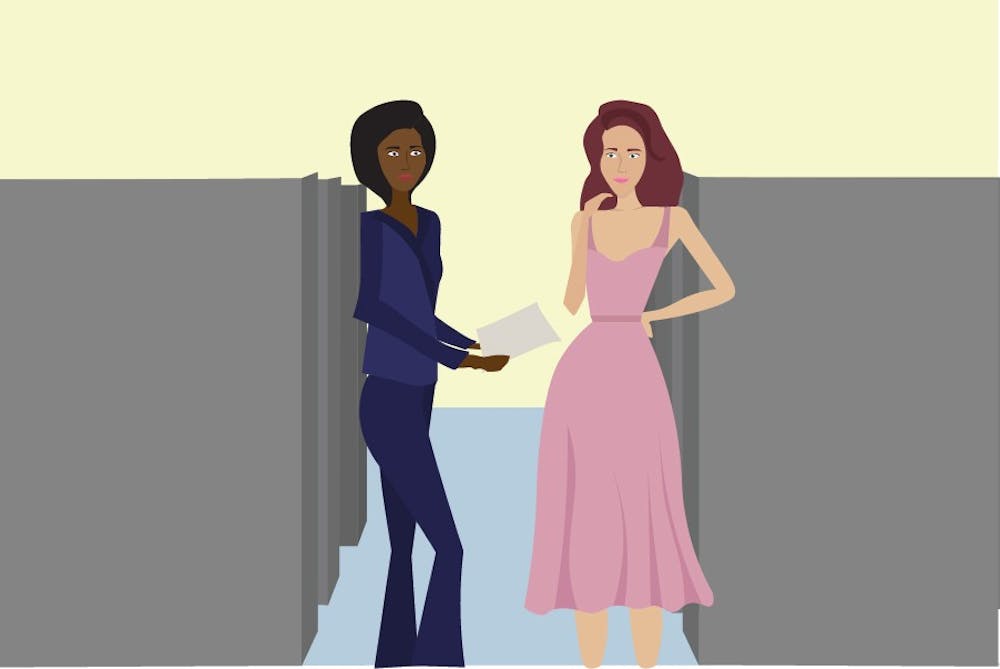Sit up straight. Stop saying “sorry.” Better hope that pink manicure doesn’t make you look ditzy. Exclamation points in your email? Calm down, princess.
Women deal with a lot of behavior policing in the workplace. We throw our shoulders back, speak more loud (but not too loudly) and keep our legs crossed, all under the guise that these small tweaks will make sexism in the office magically disappear. Unfortunately, it’s all futile advice that sends women into an unwinnable battle and allows sexism to continue festering.
See counterpoint: Women should avoid using vocal fry in the workplace.
Vocal fry is one example of a behavior women have come under fire for recently. The vocal phenomenon involves a lowering of the voice, letting it get raspy and “fry” out toward the end of a sentence.
One reason women have been advised to avoid this is because it evidently hurts job prospects and because older men don’t like it when girls talk this way.
Guess what: I give not a single damn what old men think of my voice.
Before the Kardashian era, when vocal fry really came into the spotlight, women were criticized for uptalk, or high “valley girl speak,” which is basically the opposite of the throatier vocal fry. We can’t win.
A society with deeply rooted sexism will seek any excuse to find women unworthy of respect. Many prominent men also engage in vocal fry, like Noam Chomsky and George W. Bush. No one seems to be criticizing their vocal patterns.
Recent studies show that Donald Trump speaks in a traditionally feminine way: more auxiliary verbs, less articles and with emotional language. Evidence shows that a feminine manner of talking is actually viewed as warmer and more trustworthy. Maybe there is some power in femininity after all.
Hillary Clinton, on the other hand, speaks in what is considered a more masculine manner (forceful tone, more prepositions, more first-person plural words), and people hate it. Women can’t win.
Let’s stop putting them under a microscope to try and identity something else they’re doing wrong. It would be a better use of time to deconstruct the patriarchal system that makes this seem necessary.
Equality is simple: women shouldn’t have to jump over extra hurdles that men don’t in order to gain respect.
Rachel Reinke, a women’s studies professor at ASU, said that women are more harshly critiqued for their behavior because they don’t fit what has been historically deemed powerful in the workplace.
“It has a lot to do with how particular institutions have legitimized certain ways of talking and delegitimized other ways,” she said.
“What usually happens with vocal fry is no matter what the person is saying, no matter how intelligent she sounds or how well thought-out her points are, people don’t listen to her. They just don’t give that same critique to someone who speaks in a more accepted, ‘white male’ way of talking.”
Telling women to change their behavior and “just work harder” to avoid sexism is problematic because it puts the responsibility with the woman rather than the person actually doing the discrimination. It’s a corporate form of victim-blaming. In addition, it ignores certain groups who have systemic barriers to getting ahead.
“It can be really damaging because it sets us back in terms of social justice endeavors in making places more inclusive,” Reinke said.
There are definitely benefits to being aware of one’s speech and the ways it can be more powerful. A key tenet of I Am That Girl, a national girls’ empowerment club, is removing disclaimers from one’s language. Saying how I feel right off the bat without having to introduce it with “this is weird, but …” has made me more confident in my feelings and statements.
Likewise, I’ve tried to quit saying “sorry” for things I’m not sorry for and taken the word “just” out of my emails. Many women feel empowered by taking back their voices.
Read more about female tentative language here.
Women shouldn’t have to constantly worry that all their hard work is void because of the way they said a particular word. Just like dressing a certain way won’t stop you from being harassed, acting a certain way won’t shield you from sexism. The responsibility lies with the sexist.
Next time you find it hard to take a woman seriously because of her voice, her clothes or some other arbitrary detail that’s telling you her estrogen makes her stupid, take a moment to step back, rub the misogyny out of your eyes, and listen to her.
Really listen.
Reach the columnist at lallnatt@asu.edu or follow @LibbyAllnattASU on Twitter.
Like The State Press on Facebook and follow @statepress on Twitter.
Editor’s note: The opinions presented in this column are the author’s and do not imply any endorsement from The State Press or its editors.
Want to join the conversation? Send an email to opiniondesk.statepress@gmail.com. Keep letters under 300 words and be sure to include your university affiliation. Anonymity will not be granted.




